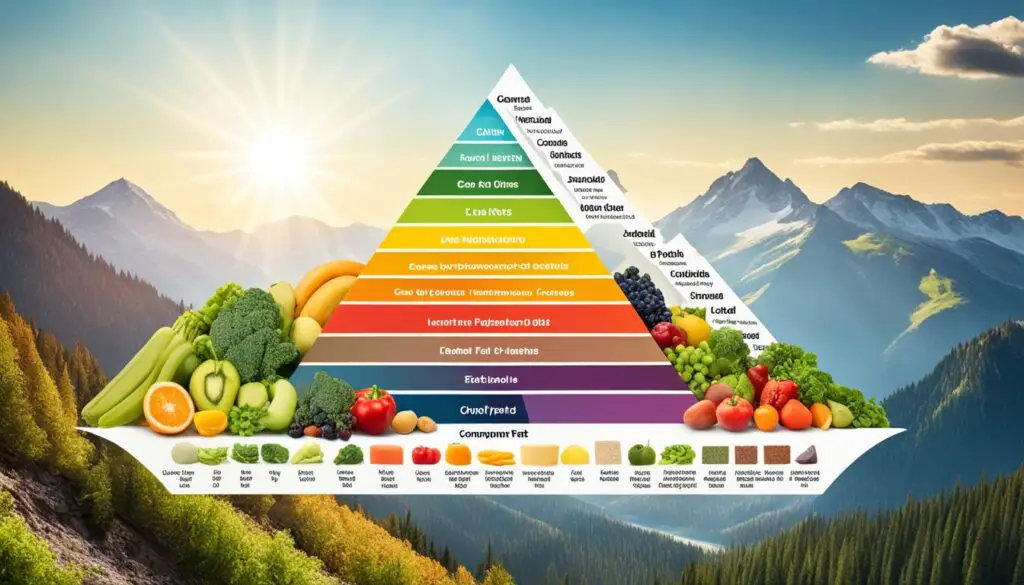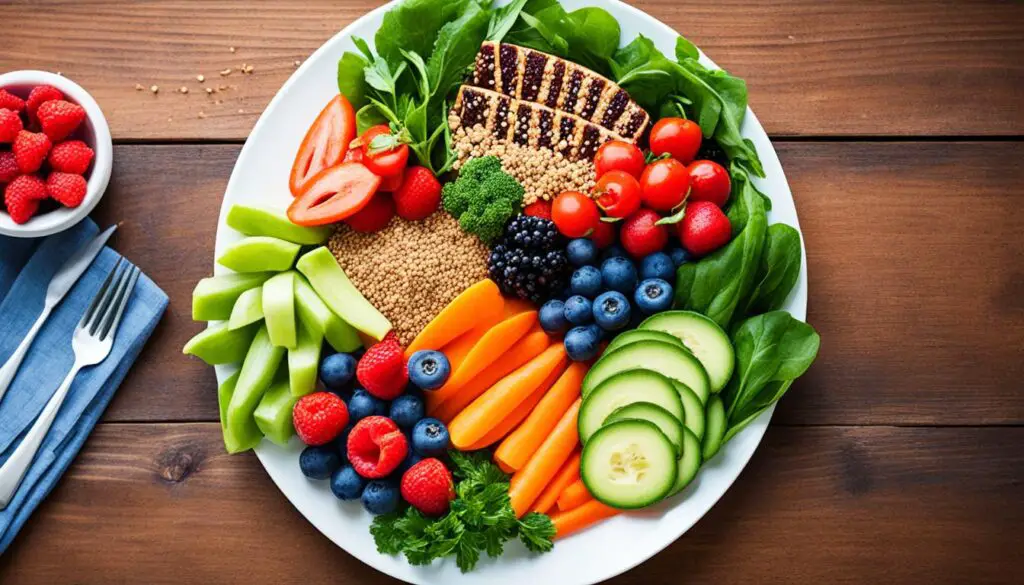Have you successfully completed the HCG diet and achieved your weight loss goals? Congratulations! But now comes the challenge – how do you maintain your weight after the diet ends? Many people struggle with weight regain once they stop the HCG injections and return to a normal calorie intake. But don’t worry, I’ve got you covered. In this article, I will reveal the best exercise strategies to help you maintain your weight after the HCG diet. Are you ready to discover the key to long-term success?
Key Takeaways
- Gradually increase your calorie intake after the HCG diet to prevent weight regain.
- Return to a normal diet routine by reintroducing sugars and starchy foods in moderation.
- Formulate an exercise routine that includes cardiovascular exercise and resistance training.
- Choose a supportive clinic for the HCG diet to ensure success and minimize risks.
- Understand the different phases of the HCG diet for effective weight maintenance.
The Problem with HCG Dieters
While the HCG diet is successful in promoting weight loss, many individuals face the challenge of maintaining their weight after completing the diet. This poses a significant problem for HCG dieters, as weight gain can occur once calorie intake returns to normal. The body, having experienced calorie restriction during the diet, may respond by holding onto calories as a protective mechanism against future deprivation. This phenomenon can impede long-term weight maintenance after the HCG diet.
To prevent weight rebound after the HCG diet, it is essential to implement strategies that address this problem. Gradual and strategic approaches to calorie intake, a return to a balanced diet, and regular exercise can all contribute to successful long-term weight maintenance. Let’s explore these strategies in more detail.
Gradual Increase of Calorie Intake

After completing the HCG diet, it is crucial to approach calorie intake with care to avoid confusing the body and triggering weight gain. Gradually increasing calorie consumption is the key to maintaining weight loss and preventing excessive weight regain. Starting with a modest increase of 200 calories per day and gradually reaching the recommended daily intake of around 1500 calories allows the body to adjust and establish a healthy balance.
It is important to keep in mind that the exact calorie intake may vary depending on individual factors such as age, sex, activity level, and metabolism. Calculating the optimum calorie consumption based on your body weight can provide a benchmark for gradual increases tailored to your specific needs.
By gradually increasing calorie intake, you give your body time to readjust to a normal diet routine while avoiding sudden jumps in calorie consumption that could lead to weight gain. This gradual approach helps maintain the equilibrium achieved during the HCG diet and ensures long-term success in weight management.
Implementing this gradual increase in calorie intake after the HCG diet allows your body to adapt and transition smoothly into a regular diet. It is important to make mindful food choices and prioritize nutrient-rich foods to support overall health and weight maintenance.
Bring Back Your Normal Diet Routine
After completing the HCG diet, it’s essential to reintroduce sugars and starchy foods gradually to prevent weight gain and maintain a balanced diet. The HCG diet restricts the intake of these food groups to promote weight loss, but reintegrating them into your eating routine is crucial for long-term success.
Start by incorporating low-carb and low-fat options into your meals. This can include whole grains, fruits, vegetables, and lean proteins. These choices provide essential nutrients while minimizing the risk of weight regain.
It’s important to keep everything in moderation and monitor your weight throughout this process. If you notice any significant changes, such as weight gain or bloating, consider making adjustments to your diet. Each individual’s body reacts differently, so it’s crucial to find the right balance for your specific needs.
Remember, balance is key. Reintroducing sugars and starchy foods should be a gradual process to allow your body to adjust. By doing so, you’ll be able to enjoy a variety of foods while maintaining a healthy weight.
Reintroducing Sugars and Starchy Foods
“The gradual reintroduction of sugars and starchy foods after the HCG diet helps prevent weight gain and stabilizes your body’s response to these food groups. By starting with healthier options and monitoring your weight, you can enjoy a balanced diet while maintaining your HCG diet results.” – Dr. Emily Johnson, Weight Loss Specialist
Formulate an Exercise Routine

Exercise is crucial for maintaining weight after the HCG diet. While strenuous exercise is not recommended during the diet period, it becomes necessary once the diet is completed in order to prevent weight regain. By engaging in at least 75 minutes of vigorous exercise or 150 minutes of moderate exercise per week, individuals can effectively maintain their weight.
Cardiovascular exercises, such as running, swimming, or cycling, are commonly recommended to improve cardiovascular health and burn calories. These exercises elevate the heart rate and help to shed excess weight gained after completing the HCG diet. Resistance training, on the other hand, helps to build lean muscle mass and increase metabolism, preventing weight gain in the long run.
It is important to note that the exercise routine should be tailored to an individual’s preferences and physical capabilities. Any activity that fits into a person’s lifestyle and can be performed consistently is effective for weight maintenance. Whether it’s dancing, yoga, or playing a sport, finding an enjoyable exercise routine is key to long-term success.
“Exercise is not only essential for maintaining weight after the HCG diet, but it also has numerous other health benefits. Regular physical activity improves mood, boosts energy levels, and reduces the risk of chronic diseases.”
Remember to start gradually and listen to your body. Initially, you may experience some muscle soreness and fatigue as you reintroduce exercise into your routine. Take it slow and allow your body time to adapt. Once you establish a consistent exercise habit, it will become easier to maintain your weight and enjoy the many benefits of an active lifestyle.
To summarize, formulating an exercise routine is a crucial component of weight maintenance after the HCG diet. Engaging in a combination of cardiovascular exercises and resistance training, for at least 75-150 minutes per week, can help individuals maintain their weight loss and achieve long-term success. Remember to find activities that you enjoy and gradually increase intensity to prevent injury and ensure sustainability.
Choose a Supportive Clinic for HCG Diet
When embarking on the HCG diet journey, selecting a supportive clinic is paramount to ensure a successful and safe experience. Authorized clinics that offer medically supervised HCG programs can provide the necessary guidance and expertise for individuals seeking to achieve their weight loss goals.
When searching for a supportive clinic, it is recommended to use phrases like “HCG diet near me” to generate a list of options to consider. The proximity of the clinic can be a crucial factor, especially when regular check-ins and consultations are necessary during the HCG diet program.
Authentic, authorized clinics are staffed with medical professionals experienced in administering the HCG diet and can provide personalized recommendations based on individual needs and health conditions.
Benefits of Choosing a Supportive Clinic for HCG Diet:
- Expert guidance: Medically supervised HCG programs ensure that a team of experts oversees your progress, offering support and addressing any concerns that may arise during the diet.
- Minimized risks: Authorized clinics prioritize safety and are equipped to handle any potential side effects or complications that may occur during the program.
- Personalized approach: Clinics that offer medically supervised HCG programs can tailor the diet plan to suit your unique needs, taking into account factors such as current health conditions, medical history, and weight loss goals.
- Evidence-based practices: Choosing an authorized clinic can provide confidence in the credibility and effectiveness of the HCG diet program, as these clinics follow legitimate protocols and evidence-based practices.
- Continued support: Supportive clinics offer ongoing guidance even after the completion of the HCG diet, ensuring a smooth transition into post-diet maintenance and long-term weight management.
By choosing a supportive clinic for the HCG diet, individuals can embark on their weight loss journey with confidence, knowing that they have a dedicated team of professionals guiding and supporting them every step of the way.
“Selecting a supportive clinic is the first step towards a successful HCG diet experience. Authorized clinics with medically supervised programs provide a personalized approach, expert guidance, and continued support, ensuring optimum results and long-term weight maintenance.”
| Benefits of Choosing a Supportive Clinic for HCG Diet |
|---|
| Expert guidance |
| Minimized risks |
| Personalized approach |
| Evidence-based practices |
| Continued support |
In the next section, we will explore the importance of understanding the different phases of the HCG diet and its impact on successful weight loss and maintenance.
Understand the hCG Diet Phases

The hCG diet is divided into three distinct phases: the loading phase, the weight loss phase, and the maintenance phase. Each phase plays a crucial role in achieving weight loss and successfully maintaining it.
Loading Phase
In the loading phase, the individual increases their calorie intake to build up fat stores. This phase typically lasts for two days and allows the body to prepare for the restricted calorie phase that follows. During this period, an individual can consume high-calorie foods without worrying about weight gain.
Weight Loss Phase
The weight loss phase is the most challenging phase of the hCG diet. Calorie intake is restricted to only 500 calories per day, accompanied by daily hCG hormone injections. The combination of the low-calorie diet and hCG injections helps target stored fat, triggering rapid weight loss. This phase typically lasts for several weeks, depending on an individual’s weight loss goals.
Maintenance Phase
The maintenance phase is the final phase of the hCG diet. Calorie intake gradually increases, and a healthy eating routine is established to ensure long-term weight maintenance. During this phase, individuals transition to a balanced diet that includes lean proteins, fruits, vegetables, and whole grains. Regular exercise is also emphasized to support weight maintenance and overall health.
To illustrate the hCG diet phases, a comprehensive table is provided below:
| Phase | Description | Duration |
|---|---|---|
| Loading Phase | Increased calorie intake to build up fat stores | 2 days |
| Weight Loss Phase | Restricted calorie intake of 500 calories per day with hCG hormone injections | Several weeks |
| Maintenance Phase | Gradual increase in calorie intake and establishment of a healthy eating routine | Ongoing |
Setting Realistic Expectations for Weight Loss

When embarking on the HCG diet, it is important to set realistic expectations for weight loss. While the diet can lead to significant weight reduction, it is essential to understand the average weight loss experienced and the limitations of the diet. By managing weight loss goals effectively, individuals can prevent disappointment and maintain motivation throughout their journey.
The average weight loss with one round of the HCG diet is around 20 pounds. This can vary depending on individual factors such as starting weight, metabolism, and adherence to the diet protocol. It’s important to remember that weight loss is a gradual process and can differ from person to person. Therefore, setting achievable goals based on personal circumstances is crucial in order to maintain motivation and prevent frustration.
For individuals with significant weight to lose, it may be necessary to complete multiple rounds of the HCG diet. It’s important to approach this in a strategic and systematic manner, taking breaks between rounds to allow the body to stabilize and prevent burnout. By understanding that weight loss is a journey and may require multiple rounds, individuals can manage their expectations and stay committed to their goals.
It’s also important to consider the limitations of the HCG diet. While it can be an effective tool for weight loss, it is not a magic solution. The diet requires a strict adherence to a low-calorie intake and should be followed under the supervision of a healthcare professional. Understanding the challenges and commitment required can help individuals stay realistic about their expectations and make informed decisions about their weight loss goals.
“By managing weight loss goals effectively, individuals can prevent disappointment and maintain motivation throughout their journey.”
It’s crucial to approach the HCG diet with a positive mindset and realistic expectations. Celebrating milestones along the way, focusing on non-scale victories, and seeking support from healthcare professionals and a supportive community can help individuals stay motivated and committed to their weight loss goals. Remember, lasting weight loss is a journey, and by setting realistic expectations, individuals can set themselves up for long-term success.
Key Takeaways:
- Set achievable goals based on personal circumstances and the average weight loss experienced with the HCG diet.
- Understand that multiple rounds of the diet may be necessary for individuals with significant weight to lose.
- Recognize the strict adherence and limitations of the HCG diet for effective weight loss.
- Celebrate milestones, focus on non-scale victories, and seek support from healthcare professionals and a supportive community.
| Pros | Cons |
|---|---|
| Effective for weight loss | Strict calorie restriction |
| Quick initial results | Can be challenging to sustain |
| Resets metabolism | Requires medical supervision |
| Can provide a jump-start to a healthier lifestyle | May require multiple rounds for significant weight loss |
Importance of Regular Exercise

Regular exercise plays a vital role in maintaining weight after completing the HCG diet. It not only helps with weight management but also contributes to overall health and well-being. Incorporating exercise into your daily routine is essential for preventing weight regain and supporting long-term weight maintenance.
Exercise helps develop healthy habits that promote a balanced lifestyle. By engaging in physical activity, you create a positive routine that encourages discipline and consistency. This can greatly contribute to your ability to maintain your weight loss after the HCG diet.
Exercise also aids in controlling calorie intake by burning additional calories and increasing your metabolism. When combined with a healthy diet, regular exercise can help create a calorie deficit, which is necessary for weight maintenance. It allows you to enjoy a wider range of food options without the fear of weight gain.
“The only bad workout is the one that didn’t happen.” – Unknown
Besides weight management, exercise offers numerous benefits for your overall health. It strengthens your cardiovascular system, improves muscle tone, and enhances endurance. Regular physical activity also boosts mood and reduces stress, promoting mental well-being.
To maximize the benefits of exercise after the HCG diet, it’s important to find activities that you enjoy and are sustainable in the long run. This could include cardio exercises like jogging, swimming, or cycling, as well as strength training exercises using weights or resistance bands.
Here are some notable benefits of exercise for weight maintenance:
- Helps burn calories and maintain a healthy weight
- Improves cardiovascular health and reduces the risk of heart disease
- Increases muscle mass and improves muscle tone
- Boosts metabolism, leading to improved calorie burning even at rest
- Enhances mood, reduces stress, and promotes mental well-being
Remember, consistency is key when it comes to exercise. Aim for at least 150 minutes of moderate-intensity aerobic exercise or 75 minutes of vigorous-intensity aerobic exercise each week, along with two or more days of strength training exercises. Make exercise a priority and enjoy the long-term benefits it brings to your health and weight maintenance after the HCG diet.
| Exercise | Calories Burned per Hour* |
|---|---|
| Running (8 mph) | 861 |
| Cycling (16-19 mph) | 816 |
| Swimming | 572 |
| Strength training | 382 |
| Walking (brisk pace, 4 mph) | 314 |
*Calorie burn may vary depending on factors like body weight, intensity, and individual metabolism.
Maintaining a Healthy Balanced Diet

After completing the HCG diet, it is crucial to transition to a healthy balanced diet to maintain your weight. By making conscious choices and opting for nutrient-rich foods, you can support your overall health and ensure sustainable weight management.
Choose Healthy Food Choices
When selecting your post-HCG diet meals, prioritize vegetables, fruits, lean proteins, and whole grains. These foods are packed with essential nutrients, vitamins, and minerals that fuel your body while promoting satiety. Incorporating these options into your daily diet can help you maintain a healthy balance.
Avoid Processed and High-Calorie Foods
To prevent weight gain and support long-term weight maintenance, it’s important to steer clear of processed and high-calorie foods. These items often lack essential nutrients, contribute to weight gain, and can undermine your efforts to sustain a healthy lifestyle. By avoiding these foods, you can stay on track and maintain the progress you achieved through the HCG diet.
Choosing nutrient-rich foods and avoiding processed and high-calorie options is key to maintaining a healthy balanced diet after completing the HCG diet.
By maintaining a healthy balanced diet, you can ensure a steady supply of essential nutrients while keeping your calorie intake in check. This approach supports your overall health, helps prevent weight regain, and allows you to sustain the positive changes you achieved through the HCG diet.
Nutrient-Rich Foods for a Healthy Balanced Diet
| Food Group | Examples |
|---|---|
| Vegetables | Spinach, kale, broccoli, carrots |
| Fruits | Apples, berries, citrus fruits, bananas |
| Lean Proteins | Chicken breast, turkey, fish, tofu |
| Whole Grains | Brown rice, quinoa, whole wheat bread, oats |
To maintain your weight and promote overall well-being, strive to incorporate these nutrient-rich foods into your meals. Supporting your body with a variety of healthy options sets the foundation for long-term success.
Conclusion
Maintaining weight after the HCG diet is essential for long-term success and transforming your lifestyle. By following a few key strategies, you can sustain your weight loss and achieve your weight maintenance goals.
Firstly, gradually increasing your calorie intake after completing the HCG diet is crucial. Start by adding around 200 calories per day and gradually work your way up to the recommended daily intake of approximately 1500 calories. This gradual increase helps your body adjust and prevents excessive weight regain.
Secondly, returning to a normal diet routine is important. Reintroduce sugars and starchy foods gradually, opting for low-carb and low-fat options initially. Keep everything in moderation and monitor your weight to make necessary adjustments along the way.
Lastly, regular exercise is vital for maintaining weight after the HCG diet. Engage in at least 75 minutes of vigorous exercise or 150 minutes of moderate exercise per week. Cardiovascular exercises and resistance training are recommended, but choose activities that suit your lifestyle and preferences.
By understanding the HCG diet phases, setting realistic expectations, and prioritizing healthy habits, you can achieve long-term success with weight maintenance. Remember, maintaining weight is a journey, and with dedication and perseverance, you can sustain the positive changes you have made.
FAQ
What is the best way to maintain weight after completing the HCG diet?
Gradually increasing calorie intake, returning to a normal diet routine, and engaging in regular exercise are essential for maintaining weight after the HCG diet.
Why do many people struggle to maintain their weight after the HCG diet?
The HCG injections and strict calorie restriction during the diet can put the body into starvation mode, causing it to hold onto calories as a defense mechanism against future calorie restriction.
How should calorie intake be increased after completing the HCG diet?
Calorie intake should be gradually increased, starting with an additional 200 calories per day and gradually reaching the recommended daily intake of around 1500 calories.
How should sugars and starchy foods be reintroduced after the HCG diet?
Sugars and starchy foods should be reintroduced gradually, starting with low-carb and low-fat options, and monitoring weight and making adjustments if necessary.
What types of exercises are recommended for maintaining weight after the HCG diet?
Cardiovascular exercises and resistance training are commonly recommended, but any activity that fits an individual’s lifestyle can be effective.
How important is it to choose a supportive clinic for the HCG diet?
Choosing a clinic that offers a supportive environment and is authorized to carry out the procedure is important to ensure guidance and minimize the risk of harmful side effects.
What are the different phases of the HCG diet?
The HCG diet consists of three phases: the loading phase, weight loss phase, and maintenance phase.
What kind of expectations should be set for weight loss with the HCG diet?
It is important to set realistic expectations and understand that the average weight loss with one round of the HCG diet is around 20 pounds.
How important is regular exercise for maintaining weight after the HCG diet?
Regular exercise is crucial for maintaining weight after the HCG diet as it helps develop healthy habits, control calorie intake, and improve overall health.
What should be prioritized in a healthy balanced diet after the HCG diet?
Prioritizing nutrient-rich foods like vegetables, fruits, lean proteins, and whole grains is important for maintaining weight and overall health.
How can long-term weight maintenance after the HCG diet be achieved?
Long-term weight maintenance after the HCG diet can be achieved by following the strategies of gradually increasing calorie intake, returning to a normal diet routine, regular exercise, and choosing a supportive environment.




